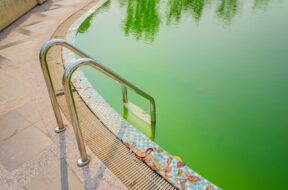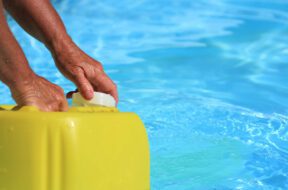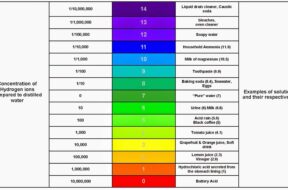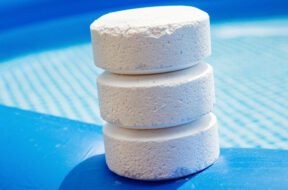
Want to learn more about algaecide? Read on to find out when to add algaecide to your pool maintenance routine and other helpful tips.
Your pool is the perfect place for family fun in the sun—if it’s kept safe and clean. It’s important to pick a method of sanitation for your pool that works for your lifestyle. There are two major types of pool sanitation: saltwater and chlorine. This article describes the benefits and challenges with both.
In a saltwater system, salt (sodium chloride) is converted into chlorine using a chlorine generator. This chlorine will kill the bacteria, algae, and viruses that may contaminate your pool. Salt water will also be gentler on hair, skin, and eyes.
This system is also less work for the owner. As the chlorine degrades, it will return to salt, so there’s no need to routinely add more salt.
While saltwater is a very effective and safe way to sanitize your pool, saltwater systems can degrade parts of your pool, so it’s important to pick equipment that is saltwater resistant when outfitting your pool. Saltwater pool systems tend to be a more complex form of sanitation. When parts need maintenance, you will need likely need to call a technician.
A saltwater system may be right for you if you are wanting sanitation that is easier on skin and eyes and are okay with the slightly heftier cost.
Pros:– Gentler on hair, skin, and eyes than a traditional chlorine system- Less routine maintenance- Water feels smooth to touch
Cons:– Repairs are costly and almost always require a technician- Saltwater can corrode other parts of the pool, so you’ll have to ensure the parts are compatible with saltwater- Expensive installation
When most people think of a backyard pool, they expect it to be a chlorine sanitation system, meaning that chlorine is added directly to the water to kill algae, bacteria, and viruses. However, chlorine is a harsh chemical that may be damaging to hair, skin, and eyes. Moreover, chlorine systems require frequent testing, so it is more work on the pool owner to maintain. Sunlight degrades and evaporates the chlorine, so you will need to keep chlorine on hand to be added to the pool whenever needed.
Pros:– Cheaper installation and maintenance – Chlorine will not damage other components of the pool, unlike saltwater systems- Maintenance can be done at home without the use of a technician
Cons:– Harsh chemical that can irritate and damage hair, skin, and eyes- May cause health problems with prolonged exposure- Requires routine maintenance
To keep your pool healthy and safe, it’s important to choose a form a sanitation that works for your lifestyle and your budget. If you’re looking for a cheaper option, are willing to put in the work with routine maintenance, and are not concerned by the use of chemicals, a chlorine pool may be just fine for you. If you have little time for maintenance, a larger budget, or a concern for health, it may be worth it to you to get a saltwater sanitation system.
Learn the components of pool chemistry, and try out the pool calculator!
For more information on how to care for your pool, visit our blog on Pool Maintenance.

Want to learn more about algaecide? Read on to find out when to add algaecide to your pool maintenance routine and other helpful tips.

In this quick guide, we’ll answer the question “can you over shock a pool” and unveil the factors to consider when shocking a pool.

Maintaining both pH and total alkalinity in your swimming pool is important for keeping your pool properly sanitized and non-corrosive. Total alkalinity is to pH what cyanuric acid is to free chlorine. Total alkalinity stabilizes pH levels. The ideal pool pH level is 7.4 to 7.6. The ideal total alkalinity level is 80 to 120 ppm.

The Association of Pool and Spa Professionals recommends free chlorine levels for both swimming pools and hot tubs be kept between 2.0 and 4.0 ppm. However, the Center for Disease Control recommends free chlorine stay above 1 ppm in pools and 3 ppm in hot tubs.